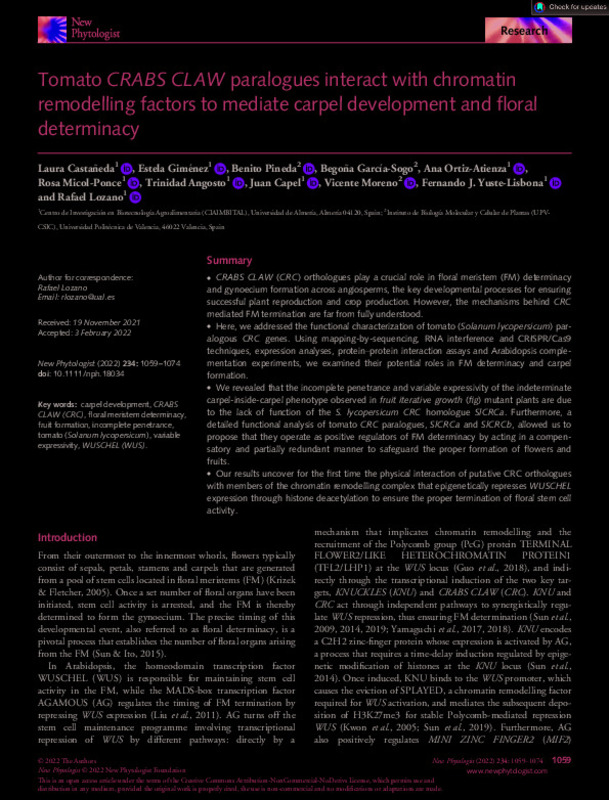Castañeda, L.; Giménez, E.; Pineda Chaza, BJ.; García Sogo, B.; Ortiz Atienza, A.; Micol-Ponce, R.; Angosto, T.... (2022). Tomato CRABS CLAW paralogues interacting with chromatin remodelling factors to mediate between carpel development and floral determinacy. New Phytologist. 234(3):1059-1074. https://doi.org/10.1111/nph.18034
Por favor, use este identificador para citar o enlazar este ítem: http://hdl.handle.net/10251/190059
|
Título:
|
Tomato CRABS CLAW paralogues interacting with chromatin remodelling factors to mediate between carpel development and floral determinacy
|
|
Autor:
|
Castañeda, Laura
Giménez, Estela

 Pineda Chaza, Benito José
Pineda Chaza, Benito José

 García Sogo, Begoña
Ortiz Atienza, Ana
Micol-Ponce, Rosa
Angosto, Trinidad
Capel, Juan
García Sogo, Begoña
Ortiz Atienza, Ana
Micol-Ponce, Rosa
Angosto, Trinidad
Capel, Juan

 Moreno Ferrero, Vicente
Yuste-Lisbona, Fernando J.
Lozano, Rafael
Moreno Ferrero, Vicente
Yuste-Lisbona, Fernando J.
Lozano, Rafael
|
|
Entidad UPV:
|
Universitat Politècnica de València. Instituto Universitario Mixto de Biología Molecular y Celular de Plantas - Institut Universitari Mixt de Biologia Molecular i Cel·lular de Plantes
Universitat Politècnica de València. Escuela Técnica Superior de Ingeniería Agronómica y del Medio Natural - Escola Tècnica Superior d'Enginyeria Agronòmica i del Medi Natural
|
|
Fecha difusión:
|
|
|
Resumen:
|
[EN] CRABS CLAW (CRC) orthologues play a crucial role in floral meristem (FM) determinacy and gynoecium formation across angiosperms, the key developmental processes for ensuring successful plant reproduction and crop ...[+]
[EN] CRABS CLAW (CRC) orthologues play a crucial role in floral meristem (FM) determinacy and gynoecium formation across angiosperms, the key developmental processes for ensuring successful plant reproduction and crop production. However, the mechanisms behind CRC mediated FM termination are far from fully understood. Here, we addressed the functional characterization of tomato (Solanum lycopersicum) paralogous CRC genes. Using mapping-by-sequencing, RNA interference and CRISPR/Cas9 techniques, expression analyses, protein-protein interaction assays and Arabidopsis complementation experiments, we examined their potential roles in FM determinacy and carpel formation. We revealed that the incomplete penetrance and variable expressivity of the indeterminate carpel-inside-carpel phenotype observed in fruit iterative growth (fig) mutant plants are due to the lack of function of the S. lycopersicum CRC homologue SlCRCa. Furthermore, a detailed functional analysis of tomato CRC paralogues, SlCRCa and SlCRCb, allowed us to propose that they operate as positive regulators of FM determinacy by acting in a compensatory and partially redundant manner to safeguard the proper formation of flowers and fruits. Our results uncover for the first time the physical interaction of putative CRC orthologues with members of the chromatin remodelling complex that epigenetically represses WUSCHEL expression through histone deacetylation to ensure the proper termination of floral stem cell activity.
[-]
|
|
Palabras clave:
|
Carpel development
,
CRABS CLAW (CRC)
,
Floral meristem determinacy
,
Fruit formation
,
Incomplete penetrance
,
Tomato (Solanum lycopersicum)
,
Variable expressivity
,
WUSCHEL (WUS)
|
|
Derechos de uso:
|
Reconocimiento - No comercial - Sin obra derivada (by-nc-nd)
|
|
Fuente:
|
New Phytologist. (issn:
0028-646X
)
|
|
DOI:
|
10.1111/nph.18034
|
|
Editorial:
|
Blackwell Publishing
|
|
Versión del editor:
|
https://doi.org/10.1111/nph.18034
|
|
Código del Proyecto:
|
info:eu-repo/grantAgreement/AEI/Plan Estatal de Investigación Científica y Técnica y de Innovación 2017-2020/PID2019-110833RB-C31/ES/REGULACION GENETICA DE LA ACTIVIDAD DE LOS MERISTEMOS REPRODUCTIVOS Y SU PAPEL EN LA MEJORA DE LA PRODUCTIVIDAD DE TOMATE/
info:eu-repo/grantAgreement/AEI/Plan Estatal de Investigación Científica y Técnica y de Innovación 2017-2020/PID2019-110833RB-C32/ES/EDICION DE PROMOTORES DE GENES QUE REGULAN EL DESARROLLO REPRODUCTIVO EN TOMATE COMO ESTRATEGIA PARA MANTENER LA PRODUCCION EN CONDICIONES DE ESTRES ABIOTICO/
info:eu-repo/grantAgreement/EC/H2020/774244/EU
|
|
Agradecimientos:
|
This work was supported by the PID2019-110833RB-C31 and PID2019-110833RB-C32 grants from the Spanish Ministry of Science and Innovation (MICI/AEI/FEDER, UE) and the BRESOV (Breeding for Resilient, Efficient and Sustainable ...[+]
This work was supported by the PID2019-110833RB-C31 and PID2019-110833RB-C32 grants from the Spanish Ministry of Science and Innovation (MICI/AEI/FEDER, UE) and the BRESOV (Breeding for Resilient, Efficient and Sustainable Organic Vegetable production) project funding by the Research and Innovation Programme of the European Union Horizon 2020 (grant agreement no. 774244). The authors thank Cristina Ferr~andiz for critical review of the manuscript. The authors also thank research facilities provided by the Campus de Excelencia Internacional Agroalimentario (CeiA3).
[-]
|
|
Tipo:
|
Artículo
|









